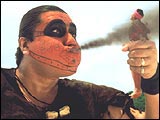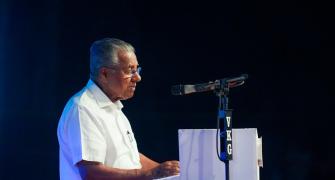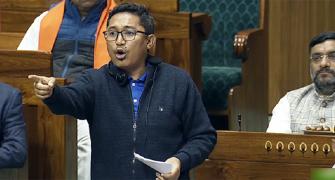Soumitra Ranade was making films while still in school. "We had a Super 8 camera at home and all of us used to make our own films," he says.
 With a family seeped in the arts (his father is an architect and his mother, a writer), Ranade never had to defend his passion for filmmaking. A gold medallist from the JJ Institute of Applied Art, Mumbai, he worked at Hindustan Thompson Associates as art director before taking off to the Film and Television Institute of India, Pune, to learn filmmaking.
With a family seeped in the arts (his father is an architect and his mother, a writer), Ranade never had to defend his passion for filmmaking. A gold medallist from the JJ Institute of Applied Art, Mumbai, he worked at Hindustan Thompson Associates as art director before taking off to the Film and Television Institute of India, Pune, to learn filmmaking.
Twelve years later, Ranade was ready to release his first Hindi feature film, Jajantaram Mamantaram (its English version is called The Power Of J2M2). He speaks to Deepa Gumaste about the realisation of his dream:
Why did it take you so long to make your first feature film?
Actually, I have been making documentary films and short fiction and animation films for several years. After FTII, I worked as an associate director with Saeed Mirza on a couple of projects. I also worked with Aziz Mirza and Kundan Shah. But since the National Film Development Corporation had almost shut shop in the 1990s, the only choice available to people like me was to enter mainstream Hindi cinema.
This was not acceptable to me or to them. The kind of scripts I was writing were offbeat and, at that time, the scene in commercial Hindi cinema was very bad. They were only making films with big stars and huge budgets. And even though most of them flopped, they wouldn't learn their lessons.
How have things have changed now?
Today, smaller films are also being made. Audiences too have started rejecting the usual commercial films. Corporate organisations like [Jajantaram Mamantaram producer] iDream don't have the typical attitude that requires you to have a filmi connection to become a director. They only look at your script and hire you.
Why did you decide to start your career with an unconventional concept like Jajantaram Mamantaram?
We make over 800 films in India every year and not a single one of them is for kids or for the entire family. It's quite horrifying to see small children dancing to the tune of Kaho naa pyaar hai. It's just not meant for them. There is a hunger among kids to see stuff that is actually made for them. This is reflected in the popularity of films like Jurassic Park or Spider-Man in India.
There is a need for these kind of films. Indian producers don't have the courage to enter this area. Kids drive every decision in the house in urban, semi-urban, and small towns. It's about time Indian producers accept these facts. If you make quality stuff for kids, it will work.
Why the unusual title?
Everybody says his or her film is different. I'd like to say the same thing about mine because it actually is very different. So, for a film like this, it is important to have a title that evokes curiosity. The actual meaning of the word is cry of the underdog.
You have merged Gulliver's Travels with the Bakasur legend. What's the idea behind doing this?
The starting point of the story was the difference between big and small. Gulliver's Travels is a world-renowned story. But our film is not like the original.
While planning the script, I was missing one guy who was big enough to stand up to Jaaved Jaaferi's character. This factor wasn't there in the original story. I wanted to add this element of danger to the hero. So I incorporated the idea of the giant who somehow became like Bakasur. Bakasur is a very interesting character -- this sleeping giant who eats up the villagers every time he is awake.
The film is loaded with special effects. Do you think you can measure up to the international standards children are now exposed to?
When we decided to make this special effects spectacle, we knew it had to be of international standard. In fact, this was one of the biggest pressures on us -- that we were trying to compete with Harry Potter in terms of quality without those kind of budgets. So we had to overcome this deficiency through hard work and imagination.
Why did you choose Jaaved Jaaferi to play your hero?
Luckily, I wasn't pressurised by iDream in the casting department. Since I have a background in art, I decided to make detailed sketches of all the characters after the script was done. The casting was based on those illustrations.
Jaaved plays a tapori from Mumbai who lands up in this place called Shundi. I couldn't think of anybody else for the part. He has a very positive body language and is a warm and funny guy who has an instant rapport with the audience.
What about Gulshan Grover?
Gulshan Grover is an amazing actor and he has done a spectacular job in my film. Besides which I find his profile very exciting. The character he plays has a pointed beard. This, juxtaposed with Gulshan's high forehead, makes a very interesting caricaturish character.
What kind of problems did you encounter because of the extensive special effects?
We have nearly 62 minutes of special effects in Jajantaram Mamantaram. All the special effects shots have got at least three to four layers. At times, there are as many as eight layers. All the layers were shot separately and composited on computer.
Before we started shooting, the entire storyboard of the film had to be in place. We had to sketch every detail of every shot and every layer. At the time of the shoot, everybody was aware of what was to be done.
It was very tough because there was no yardstick for us. This was the first time anyone was making a film like this in India. Besides, we didn't have access to expensive equipment. So we had to work out an Indian way of making a film like this. Fortunately, both Biju D, who did the special effects, and Jogendra Panda, the cameraman, are extremely techno-savvy. They were very sure of what they were doing.
Your film has been ready for six months now. How agonizing was the wait to see your first feature film make it to the big screen?
The wait was very agonizing. But every film has a positive energy about it and, at the moment, I think things are going well for us. Also, everyone involved with this project has worked very hard and is extremely emotional about this film. Already, we have found international buyers and have screened at the recently held Cannes Film Festival. But, ultimately, I want Indians to appreciate my film because it has been made for Indian kids.
What are you doing next?
I am working on my next film. It won't be loaded with special effects, but it will have some effects. I cannot imagine making a film without special effects.





